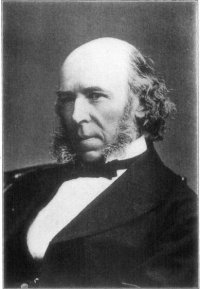Herbert Spencer Anti-Defamation League (Part 423 of ???)
Here’s noted evolutionary biologist and village atheist Richard Dawkins, in the course of his review of what seems to be a laughable little documentary that he was tricked into giving an interview for:
My own view, frequently expressed (for example in the The Selfish Gene and especially in the title chapter of A Devil’s Chaplain) is that there are two reasons why we need to take Darwinian natural selection seriously. Firstly, it is the most important element in the explanation for our own existence and that of all life. Secondly, natural selection is a good object lesson in how NOT to organize a society. As I have often said before, as a scientist I am a passionate Darwinian. But as a citizen and a human being, I want to construct a society which is about as un-Darwinian as we can make it. I approve of looking after the poor (very un-Darwinian). I approve of universal medical care (very un-Darwinian). It is one of the classic philosophical fallacies to derive an
oughtfrom anis. Stein (or whoever wrote his script for him) is implying that Hitler committed that fallacy with respect to Darwinism. If we look at more recent history, the closest representatives you’ll find to Darwinian politics are uncompassionate conservatives like Margaret Thatcher, George W Bush, or Ben Stein’s own hero, Richard Nixon. Maybe all these people, along with the Social Darwinists from Herbert Spencer to John D Rockefeller, committed the is/ought fallacy and justified their unpleasant social views by invoking garbled Darwinism.
There’s a fair amount to praise here, and a fair amount to pick at. For the moment, though, I’d like to point out that Dawkins’ characterization of Herbert Spencer — the 19th century radical libertarian sociologist and philosopher — is completely wrong on two different counts.

Herbert Spencer, dirty evolutionist hippie
First, Spencer was not a Social Darwinist.
He was not, in fact, a Darwinist at all; he published his most famous work on evolution and society, Social Statics, in 1851, eight years before Charles Darwin first published On the Origin of Species. His ideas about evolution, especially as applied to society, were Lamarckian, rather than Darwinian; which is not ultimately that surprising, since he came up with them independently of Darwinian evolutionary theory, and before that even existed in published form.
Second, Dawkins is completely wrong about Spencer’s radical political views, which bear virtually no resemblence to the belligerent Rightism and economic royalism of Thatcher, Bush, Nixon, or Rockefeller. Spencer was in fact a feminist, a labor radical, and a vehement critic of European imperialism (which he described as bearing a very repulsive likeness to the doings of buccaneers
). Contrary to the most popular, and most wildly inaccurate, caricature of his social views, Spencer did not believe in cutting off charitable relief to, or mutual aid among, the poor, sick, or other folks whom the powers that be might marginalize and dismiss as unfit,
in the name of survival of the fittest.
(That is his phrase, but it is being misapplied.) Spencer opposed government welfare programs — because he opposed all forms of government command-and-control — but he believed that voluntary charity and mutual aid were not only a positive moral obligation, but in fact were features of the highest forms of social evolution (Social Statics, pp. 291-2), as the old militant mode
of hierarchy and command was supplanted by the new industrial mode
of solidarity and voluntary co-operation. Spencer devoted ten chapters of his late work, Principles of Ethics, to the duty of Positive Beneficence. He advocated the organization of voluntary labor unions as a bulwark against exploitation by capitalist bosses, and favored an economy organized primarily in free worker co-operatives as a replacement for the slavery
of capitalist wage-labor.. For those — like the cartoon Social Darwinist
that Spencer is so often portrayed to be — who advocated indifference or harshness towards the poor and blamed poverty on the ignorance, folly, or vices of the poor people themselves, Spencer himself had nothing but contempt:
It is very easy for you, O respectable citizen, seated in your easy chair, with your feet on the fender, to hold forth on the misconduct of the people – very easy for you to censure their extravagant and vicious habits …. It is no honor to you that you do not spend your savings in sensual gratification; you have pleasures enough without. But what would you do if placed in the position of the laborer? How would these virtues of yours stand the wear and tear of poverty? Where would your prudence and self-denial be if you were deprived of all the hopes that now stimulate you …? Let us see you tied to an irksome employment from dawn till dusk; fed on meager food, and scarcely enough of that …. Suppose your savings had to be made, not, as now, out of surplus income, but out of wages already insufficient for necessaries; and then consider whether to be provident would be as easy as you at present find it. Conceive yourself one of a despised class contemptuously termed
the great unwashed; stigmatized as brutish, stolid, vicious … and then say whether the desire to be respectable would be as practically operative on you as now. … How offensive it is to hear some pert, self-approving personage, who thanks God that he is not as other men are, passing harsh sentence on his poor, hard-worked, heavily burdened fellow countrymen …. (Social Statics, pp. 203–5)
Of course, there is plenty in Spencer’s views that Dawkins, as a Social Democrat, would object to. But Dawkins has not yet succeeded in identifying what those disagreements would be. Spencer’s humanitarian, pro-labor, pro-charity radical left libertarianism has just about nothing in common with the authoritarian Right-wing political economy that Dawkins rightly condemns.